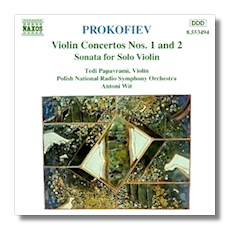
The Internet's Premier Classical Music Source
Related Links
- Prokofieff Reviews
- Latest Reviews
- More Reviews
-
By Composer
-
Collections
DVD & Blu-ray
Books
Concert Reviews
Articles/Interviews
Software
Audio
Search Amazon
Recommended Links
Site News
 CD Review
CD Review
Serge Prokofieff

Violin Concertos
- Violin Concerto #1 in D Major, Op. 19 (1913)
- Violin Concerto #2 in G minor, Op. 63 (1935)
- Sonata for Solo Violin in D Major, Op. 115
Tedi Papavrami, Violin
Polish National Radio Symphony Orchestra/Antoni Wit
Naxos 8.553494 DDD 61:39
Papavrami tosses his hat into the ring to challenge the formidable competition in this popular pair of concertos: Chung/Previn (London), Mordkovitch/Järvi (Chandos), Sitkovetsky/Davis (Virgin), Perlman/Rozhdestvensky (Angel), Bell/Dutoit (London), and individual issues of #1 by Mutter/Rostropovich (Erato) and Vengerov/Rostropovich (Teldec), as well as the recent #2 by Perlman/Barenboim (Erato), all of which have offered something out the ordinary. Oh, the two icons of the past in this repertory, Szigeti (in #1) and Heifetz (in #2) can't exactly be overlooked (but I must confess to never warming up much to Heifetz, at least in his second recording, with Munch on RCA from around 1960). Where does Papavrami (born, 1971) fit in this distinguished assemblage?
The thing you notice first about him is his strikingly individual style: a solid, accurate tone that he can, and often does, drop to quiet pianissimos in rapid passages, only to spring adroitly back to fullness; a technique that allows him to play the trills and quivering notes in the closing moments (track 3, beginning at 6:46) of the First with astonishing finesse and accuracy; and a grip on the music's structure that suggests maturity, if not complete mastery. His phrasing of the reappearance of the lyrical alternate theme in the Second's first movement (track 4; 8:14), for instance, is absolutely stunning, played worlds more sensitively than in Stern/Ormandy from the 1960s. And his sul ponticello effects in the First's Scherzo are brilliantly executed. Some may accuse him of being too cute, however: Papavrami, as suggested, occasionally exaggerates contrasts in his dynamics to the music's detriment: try his buildup in the finale of the Second (track 6; 5:09) where he often begins a phrase in a sort of quiet haze to enhance an outburst moments later, or to contrast with subsequent, well-articulated accents. Overall, however, this proves a minor flaw; some listeners may even like the effect.
In the end, Papavrami comes across as a violinist with superb technique and good ideas. His readings of the concertos certainly place him in the running with the best. He is the equal of Mutter in the First, though I favor Perlman (Erato) in the Second. But for a disc containing both works Papavrami's ranks with my previous favorite, Chung/Previn. If Angel has reissued the Milstein performances, they, too, would be a worthy contender.
What may hold this Naxos performance back a bit is the periodic disengaged conducting of Antoni Wit, whose pointing up of orchestral detail in a few places seems grudging or lacking in impact. Try the first movement development of the Second, wherein the horns at 4:58 lack punch, and where the close of this section is not forcefully punctuated by staccato strings. Still, his overall contribution, especially in the First, is more than decent, and Naxos' sound is absolutely splendid. And you get an excellent reading of the rarely encountered Solo Sonata, originally conceived by Prokofieff to be played by an ensemble of violins. All things considered, not least of which is Naxos' low price, this release must rate a high priority.
Copyright © 1997, Robert Cummings




















